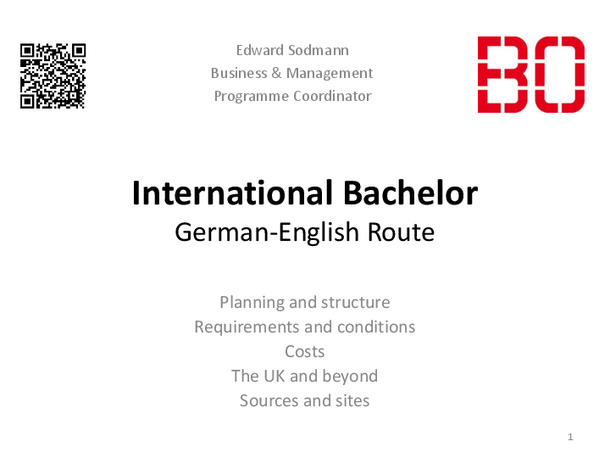Welcome to my website
How I can help you
Finding a suitable host university for your year abroad | Providing academic references (PROMOS, BO Auslandsstipendium, Auslands-BAföG, Advising on selected internship opportunities |
|---|
IBM studies programme, English skill improvement, studies abroad, and career-related tips
I hope you can find the information you need.
Find out who I am looking at the evaluation results, my personality profile and the conceptual background of why I do things the way I do them. The goals of this seminar and the learning outcomes may also be interesting to you because your experiences and expectations based on your secondary schools might be very different.
Evaluation results winter semester 2023
IBM3 (all groups)
Tipps zum Thema Fremdsprachen
Sprachenlernen ist ein gelungenes Mix aus Input und Output; generell zeigen sich in den Korrekturen große Defizite in der Erklärungs-, Eleuterungs- oder Darstellungskompetenz. Das bedeutet, dass Studierende nicht mehr genügend im Austausch mit anderen diese Fähigkeiten üben können. Also muss das Ziel sein, unter Studierenden sich gegenseitig Filme, Bücher, Zusammenhänge und anderes Interessante näher zu bringen.
Beim Wissenserwerb geht es generell immer erst um die möglichst realistische Einschätzung der Kompetenzstufe. Dazu werden online kostenlose Tools angeboten, die eine Einstufung ermöglichen.
Dann gilt es, die Lernform zu bestimmen.
Viele Online Plattformen bieten herkömmliches Lernmaterial und Arbeitsformen an. Dazu mehr auf einer gesonderten Seite.
Sollten Sie wie ich besonders gerne hörend lernen, bietet das Internet unzählige Möglichkeiten. Wer mehr Zeit hat, kann mit Youtube Material fantastische Fortschritte machen.
Die Online Wörterbücher sind in jedem Fall hilfreich, auch wenn die Details nur in guten, gedruckten Wörterbüchern abgebildet werden können.
Dazu die passenden Wörterbücher
Leo (Übersetzungswörterbuch D - E/Ch/F/I/Sp/Rus)
dict.cc (Übersetzungsplatform mit der Möglichkeit des Vokabeltrainings und Übungslisten für einen Euro im Jahr)
Linguee (ganze Textpassagen)
Websters u.a. (USA)
Eine kostenlose, online IELTS Vorbereitung gibt es hier.
Mein Favorit ist aber die Birkenbihl Methode, die einen ungewohnten Ansatz bietet. Besonders schätze ich das passive Lernen und empfehle Studierenden, mit Hilfe von Videoplatformen das Sprachverständnis auch besonders in der Fachsprache zu verbessern. Der Audio-Sprachkurs Birkenbihl Basiskurs Business Englisch ist für unter 10 Euro auch aus inhaltlichen Gründen interessant (Management Fähigkeiten).
Social Media Möglichkeiten: Sprachtandem Ruhrgebiet
Hier suchen Deutsche und Internationale neugierige Muttersprachler aller Sprachrichtungen (sogar Urdu!):
www.facebook.com/groups/167189320115105/
Das eTandem Projekt an der RUB:
www.zfa.rub.de/ils/lernen/index.html.de
Und am Schluss noch etwas zu Sprachkursen im Ausland.
Meiner Meinung nach sind Sprachkurse an Hochschulen sehr empfehlenswert.
So googelt man einen Hochschul-Kurs in GB - man kann durch Ändern oder Ergänzen der Suchtermini natürlich passendere Ergebnisse erzielen (Beispielsuche).
Der DAAD hat - wie immer - exzellente Informationen zu dem Thema versammelt:
www.daad.de/ausland/sprachen-lernen/links/de/479-weitere-sprachkurse-weltweit/
Online Einstufungstests
Zur Einschätzung der eigenen Sprachkompetenz gibt es online einige kostenlose Einstufungstests, z.B.
- Self assessment English evaluation test (UK)
- Assess your English online (Canada)
- Self-Assessment für Studieninteressierte (Germany)
- MONDIALE (technical and business English) mock exam (Germany)
Online Sprachübungen sind hilfreich und oft kostenlos
- BBC Learning English
- British Council Learn English
- VOA Learning English (USA)
- Better English
- Free Business English online
- Business English Materials
Online Writing Tools
- Grammar-check.org (browsergestützt, sehr brauchbares Feedback)
- Grammarcheck (browsergestützt mit kostenlosem, einfachen Feedback)
- Wordcounter (browsergestützt mit Feedback von Grammarly)
Online business simulations
Free business simulations to practice your English
Business simulations are a great way of practising your strategic skills while using English.
Here are some that are (at least when I checked) free.
Rich Dad (cashflow)
INNOV8 2.0 (business process management)
EIS Simulation (change management)
SimCEO (entrepreneurship and investment)
Many others from MIT Sloane are free but it is impossible to save the game etc without paying.
Almost free for your smartphone:
Hipster CEO (tech startups)
Here is where you can find many more:
Practice makes perfect: Reading business texts will help you greatly when trying to enhance your language competence.
Of course, you can choose a publication like Spotlight. It is well made and offers a great variety of topics and exercises.
For my students, I always recommend online business news because this source is (still) free.
Here are some sites I often use:
http://www.bbc.com/news/business/
Or podcasts that I find extremely interesting because they are almost like documentaries:
Coaching for Leaders
coachingforleaders.com
Wake up to money (BBC)
www.bbc.co.uk/programmes/b0070lr5/episodes/downloads
Business daily (BBC)
https://www.bbc.co.uk/programmes/p002vsxs/episodes/downloads
The Indicator
www.npr.org/podcasts/510325/the-indicator-from-planet-money
Marketplace morning report
www.marketplace.org/shows/marketplace-morning-report/
The world of business (BBC)
www.bbc.co.uk/programmes/p02nrwfk/episodes/downloads
Digital Human (BBC)
www.bbc.co.uk/programmes/b01n7094/episodes/downloads
Problem Solvers - podcast series by entrepreneur.com
The Infinite Monkey Cage is the most entertaining and knowledge creating podcast (and TV show I believe) I know. The great thing here is that it is a group working out topics such as big data, asking questions, discussing the issues.
Behavioural Grooves is my latest find - very interesting for 21st century marketers: Matt Johnson & Prince Ghuman on Mid-Liminal Marketing and the Ethics of Applied Neuroscience
Senior students might want to consider reading texts that correspond to the focal areas in their studies. So a student of Marketing could find marketing texts that enhance the subject-matter competence and the respective language skills.
The best texts in terms of quality can be found using scholar.google.com.
Or these sites to improve your listening comprehension:
http://www.bbc.co.uk/news/video_and_audio/
http://www.cnbc.com/id/15839263
And finally, make sure you listen to a lot of factual podcasts - then you'll get closer to the future and reduce VUCA:
www.bbc.co.uk/sounds/play/p08sztkt
Career planning : thesis topics and job market
The third-year specialisms path the way for a career in business because they offer detailed and hands-on content delivered by the colleagues who worked in business.
I have found that many students, however, pick thesis topics that are less relevant to businesses than they might think. My advice is to first find jobs in your area of specialism and then check the requirements or job description.
For example, if your focus is International Business, you may find a large multinational pharmaceutics company looking for an International Business Development manager. Then, I recommend to my students to look at what scholar.google.com finds in terms of articles of the past three years to inspire you what you may research on. Most colleagues will be happy about your choice and the way you came to pick that topic.
Use this Google search : site:stepstone.de neuroscience consumers
Or when looking for cool jobs abroad (during your year in Dublin for example): Google search : site:indeed.com esports dublin
The other highly relevant area is about who you are as a person. Who you are determines what job activities you will find most enjoyable or absolutely horrifying.
These questions can help you to find out a bit more about yourself - but be sure to also take the various personality tests I mention here.
Do you enjoy teams? Why? Reasons!
Do you like exploring, testing?
Risk taking?
Do you spot inefficiencies in normal life?
Do you improve what you do?
Do you give non-affirmative (disagreeable) feedback to friends and/or family?
Are you critical?
Short or long term oriented?
How fast do you need bad or unpleasant feelings to go away?
Also do you learn fast?
Do you get bored easily?
Do you seek challenges?
Persönliches
Journal Articles
Sodmann, Edward. “For better or for worse? - Recent developments in Germany’s transformation to an investor- and employer-friendly country.”, in: Academy of International Business (Ed.). International Business in the 21st Century: Change and Continuity - Strategies, Institutions, Regulations and Operations. Conference Proceedings, Volume II, Manchester: 2001, p. 769-782.
Sodmann, Edward. “The euro-cents abroad: UK Foreign Direct Investment (FDI) in Germany.”, in: British Chamber of Commerce in Germany (Ed.). BCCG Yearbook 2004. Cologne: 2004, p. 34.
Sodmann, Edward. “Portfolio and Foreign Direct Investment in Germany.”, in: British Chamber of Commerce in Germany (Ed.). BCCG Yearbook 2005. Cologne: 2005, p. 37.
Sodmann, Edward. “Angie in Wonderland: Assessing foreign direct investment and private equity in Germany for 2005.”, in: British Chamber of Commerce in Germany (Ed.). BCCG Yearbook 2006. Cologne: 2006, p. 22-24.
- Developing multinational curricula and study-abroad programmes
- In-house language training strategies
- Train the trainer Business English concepts
- Growth Mindset Strategies
Sprechstunde:
Office hour online : Zoom Meeting ID: 438 650 4547 and passcode: 489653.
OSt.R. Edward Sodmann
Wirtschaftsenglisch, Wirtschaftsfranzösisch, Wirtschaftsdeutsch
Ansprechpartner für das Auslandsstudium in GB, Irland, und Erasmusaufenthalte an der Manchester Metropolitan University
Quick links to overviews
Year abroad information

The pdf outlines all there is to know about options, planning, and homecoming.

